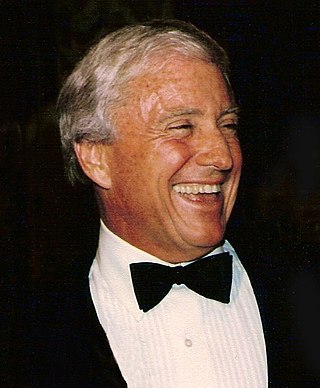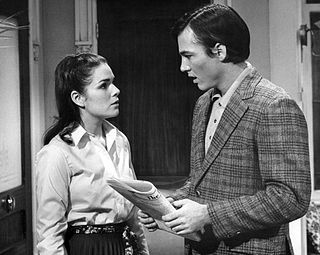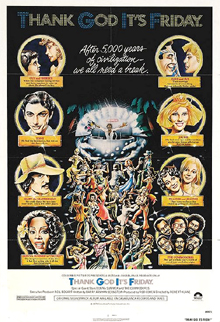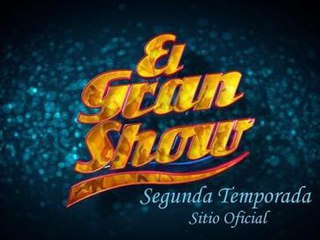Related Research Articles

Beat the Clock is an American television game show. Contestants attempted to complete challenges such as physical stunts within a time limit in order to win prizes. The show was a creation of Mark Goodson-Bill Todman Productions.

Mervyn Edward Griffin Jr. was an American television show host and media mogul. He began his career as a radio and big band singer, later appearing in film and on Broadway. From 1962 to 1986, Griffin hosted his own talk show, The Merv Griffin Show. Griffin also created several game shows, including Jeopardy! and Wheel of Fortune, through his production companies, Merv Griffin Enterprises and Merv Griffin Entertainment.
The Hustle is a catch-all name for some disco dances which were extremely popular in the 1970s. Late 1970s, Bump, Hustle, Watergate and Spank were popular. It mostly refers to the unique partner dance done in nightclubs to disco music. Hustle has steps in common with Mambo and Salsa and basic steps are somewhat similar to Euro dance style Discofox, which emerged at about the same time and is more familiar in various European countries. Modern partner hustle is sometimes referred to as New York hustle, however, its original name is the Latin hustle.

Merv Griffin Enterprises was an American television production company founded by Merv Griffin, in operation from March 7, 1963, to June 4, 1994.

Karen Lynn Gorney ) is an American actress who had roles in television shows and films including the soap opera All My Children and the movie Saturday Night Fever.

Janet Marie Gretzky is an American actress. She is married to retired ice hockey Hall of Famer Wayne Gretzky.

Thank God It's Friday is a 1978 American musical-comedy film directed by Robert Klane and produced by Motown Productions and Casablanca FilmWorks for Columbia Pictures. Produced at the height of the disco craze, the film features The Commodores performing "Too Hot ta Trot", and Donna Summer performing "Last Dance", which won the Academy Award for Best Original Song in 1978. The film features an early performance by Jeff Goldblum and the first major screen appearance by Debra Winger. The film also features Terri Nunn, who later achieved fame in the 1980s new wave group Berlin. This was one of several Columbia Pictures films in which the studio's "Torch Lady" came to life in the opening credits, showing off her moves for a few seconds before the start of the film.

Headline Chasers is an American game show that ran daily in syndication from September 9, 1985, to May 23, 1986, with reruns airing until September 5. The series was hosted by Wink Martindale, who also created the series and was its executive producer, with Johnny Gilbert serving as announcer. It was produced by Wink Martindale Enterprises and Merv Griffin Enterprises with King World Productions, Griffin's partner for his other syndicated game show offerings, as distributor. Headline Chasers was recorded at TAV Celebrity Theater in Hollywood, the same studio which housed The Merv Griffin Show.
It Takes Two was an Australian music talent show, which ran for three seasons from May 2006 to April 2008. It was based on the original UK programme Just the Two of Us.
Denis George Mahan, better known as Deney Terrio, is an American choreographer and hosted the television musical variety series Dance Fever from 1979 to 1987.

Play Your Hunch was an American game show first hosted by Merv Griffin from 1958 to 1962 and then hosted by Gene Rayburn and finally by Robert Q. Lewis until 1963. The announcers for the show were, respectively, Johnny Olson, Wayne Howell and Roger Tuttle. In 2001, Play Your Hunch was ranked #43 on TV Guide's "50 Greatest Game Shows of All Time".

Strictly Come Dancing: It Takes Two is a British television programme, the companion show to the popular BBC One programme Strictly Come Dancing. First aired on 25 October 2004, it is broadcast from Monday to Friday during the run of the main show on BBC Two at 6:30 pm.
When Disco Ruled the World is a music documentary that aired on VH1 in 2005.

Wheel of Fortune is an American television game show created by Merv Griffin. The show has aired continuously since January 6, 1975. Contestants solve word puzzles, similar to those in hangman, to win cash and prizes determined by spinning a giant carnival wheel. The current version of the series, which airs in nightly syndication, premiered on September 19, 1983.
Strictly Come Dancing is a South African reality dance competition television series produced for SABC2 by Rapid Blue, based on the British show of the same name and is part of the Dancing with the Stars franchise. It was broadcast live from the Carlton Centre Ballroom, Johannesburg. The show premiered in South Africa on SABC2 on Saturday 4 February 2006, at 20:00hrs.

Season two of El Gran Show premiered on August 14, 2010, on the América Televisión network.
Reyes del Show is the season three of the 2010 edition of El Gran Show premiered on November 6, 2010.
Reyes del Show is the third season of the 2011 edition of El Gran Show premiered on November 5, 2011.
Special Edition of the 2012 edition of El Gran Show, it was the second season of 2012 and premiered on November 24, 2012.
Season two of the 2013 edition of El Gran Show premiered on August 17, 2013.
References
- ↑ The Complete Directory to Prime Time Network and Cable TV Shows, 1946-Present. Ballantine Books. 2003. p. 274. ISBN 0-345-45542-8.